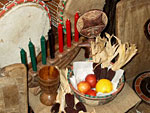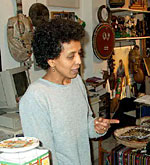By Brandt Williams
Minnesota Public Radio
December 21, 2001
|
| RealAudio |
Wednesday, Dec. 26 marks the beginning of Kwanzaa. The seven-day cultural celebration is observed by millions of people of African descent around the world. It's not known how many people in the Twin Cities participate in Kwanzaa, but some who do say the principles of Kwanzaa can be useful for all people.
| |
|
|
|
||
At this time of year, most retail stores are mobbed with Christmas shoppers trying to find last minute gifts. But at Mimi's African Art Gallery in Minneapolis, things are a little more laid back. The small store is filled floor to ceiling with intricately carved wood and stone artifacts. The earthy perfume of incense hangs in the air.
Store proprieter Mimi Girma also sells finely crafted wooden candleholders and straw mats that are used in Kwanzaa ceremonies. However, she says Kwanzaa isn't a celebration of commerce.
"This is not about buying or gift-giving," says Girma. "This is about really reflecting about the moments our ancestors have created for us in the past and remembering where we come from and what it takes for us to sustain all of those values."
Girma came to America about 20 years ago from Ethiopia. She says the seven principles of Kwanzaa - unity, self-determination, cooperative economics, purpose, creativity, collective work and responsibility and faith - are good for everyone. Kwanzaa also involves a bit of ceremony and ritual. For everyday of Kwanzaa, a candle is lit and a family or other group gathers around to discuss the principal of the day. Seven principles, seven days.
| |
|
|
|
||
Girma says this kind of practice is particularly beneficial to African Americans.
"I think rituals are a very important part of who we are as Africans," says Girma. "We've always acknowledged those important transformations that take place from birth to death, to dying . It's that fabric that really holds us together."
Kwanzaa was created in 1966 by black nationalist and African scholar Ron Karenga. During that period, there was a movement of people like Karenga who began focusing on their African roots. They noted that African nations were breaking free of european colonial rule. Karenga and others fostered the Black Arts Movement, and wrote poetry and prose extolling African values.
It was also in the '60s when a young activist changed his name from Milton Williams to Mahmoud El-Kati. Today, a Macalester history professor, El-Kati sits in a St. Paul coffee shop sipping a cup of orange herbal tea.
El-Kati says when Kwanzaa was first introduced in Minnesota in 1967 about eight families observed the celebration. He says Kwanzaa has become more popular these days because black people, like all people, want to know where they fit in the world.
"Where did I come from? Africa. Double proud of it," El-Kati beams. "Where am I going? Liberation. That's the question that human beings ask themselves; it's not a Black question. And I think that was very prounounced in the 60's. And Kwanzaa is a very expressive part of that "
At a youth Kwanzaa program held earlier this month at the State Theater, many of the students sang songs about Kwanzaa and about their African heritage. A group of eighth-grade girls sing in Swahili, "Sisi watu weusi watu azuri. Pamoja tuta shinda," which means "We are black and beautiful people. Together we will win."
The language of Swahili was chosen to express the principles and terms of Kwanzaa because the language is as close to a Pan-African language as any other. The name Kwanzaa is derived from the phrase "matunda ya kwanza" or first fruits.
The Kwanzaa program was sponsored by the Minneapolis Public Schools and the We Win Institute. Titilayo Bediako is the founder of the We Win Institute. Her organization seeks to supplement students' public school education with African-centered curriculum.
She says Kwanzaa is beneficial to Black students because it teaches them things they don't normally learn about in school. However, Bediako says students of all backgrounds benefit from Kwanzaa.
"The things that African American children want to learn about themselves, children of all cultures also want to learn," says Bediako. "They want to know good things about African Americans also."
The last day of Kwanzaa is Jan. 2. On that day, the featured principle is faith.
More Information

